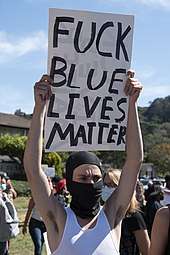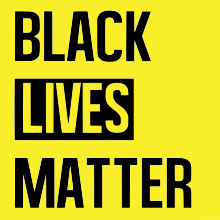Blue Lives Matter
Blue Lives Matter is a countermovement in the United States advocating that those who are prosecuted and convicted of killing law enforcement officers should be sentenced under hate crime statutes.[1] It was started in response to Black Lives Matter after the homicides of NYPD officers Rafael Ramos and Wenjian Liu in Brooklyn, New York on December 20, 2014.[2]

.svg.png) United States thin blue line flag | |
| Formation | December 20, 2014 New York City, New York, U.S. |
|---|---|
| Founders | Active and retired law enforcement officers |
| Type | Social movement |
| Location |
|
| Website | bluelivesmatter |
Criticized by the ACLU and others, the movement inspired a state law in Louisiana that made it a hate crime to target police officers, firefighters, and emergency medical service personnel.[3][4] This law has been heavily criticized for extending hate crime law protections outside of characteristics such as race, sexual orientation, or gender identity, to include career choice.[5][6] Also, evidence that violence against police officers is decreasing has been used to call into question the motivations for the law.[7][8]
History

On December 20, 2014, in the wake of the killings of officers Rafael Ramos and Wenjian Liu, a group of law enforcement officers formed Blue Lives Matter to counter media reports that they perceived to be anti-police.[9][10] Blue Lives Matter is made up of active and retired law enforcement officers. The current national spokesman for Blue Lives Matter is retired Las Vegas Metropolitan Police Department Lieutenant Randy Sutton.[11]
In September 2015, over 100 Los Angeles police officers took part in a Blue Lives Matter rally in Hollywood to "show support for the department at a time when. . .the ambush killings of police officers in cities elsewhere have left authorities across the nation feeling under siege."[12]
Legislation
Louisiana passed legislation in May 2016, making it a hate crime to target police officers or firefighters. The legislation, authored by state Representative Lance Harris, was signed into law by Governor John Bel Edwards. The law allows for hate crime felonies to carry an additional $5,000 fine or five years in prison, while hate crime misdemeanors to carry an additional $500 fine or six months in prison.[4]
Criticism

Some critics of Blue Lives Matter state that one's job can never reach a deep identity significance and source of solidarity that one's racial identity can.[13] Others state that black identity and history is constantly under threat of erasure while police officers do not face this threat.[13][14] Another source of criticism is police officers are typically respected and honored in communities while African Americans in urban areas are suspected of being thieves and freeloaders.[13][15][16] Finally, some state supporters of Blue Lives Matter are intentionally or unintentionally supporting a system of discriminatory policing and racial profiling.[17]
Some critics of Blue Lives Matter laws state the laws are redundant as attacking or killing a police officer would already result in a harsher punishment than attacking a non-police officer.[18][19][20] Others, such as St. Martinville Police Chief, Calder Hebert, say these laws will make resisting arrest a hate crime[3] which has drawn criticism as hate crimes are crimes in which victims are targeted because of identity-based characteristics such as race, sexual orientation, or gender.[5][21] Finally, according to FBI data, violence against police officers, as well as crime in general has decreased without these laws, calling into question their necessity.[7][8][22]
References
- Lynch, Sarah N. (October 16, 2017). "FBI says US police deaths spiked 61% in 2016". Business Insider. Reuters.
- John S. Dempsey; Linda S. Forst; Steven B. Carter (January 1, 2018). An Introduction to Policing. Cengage Learning. p. 34. ISBN 978-1-337-55875-4.
A pro-police movement called Blue Lives Matter was established in response to Black Lives matter and to the increasing attacks on law enforcement, which resulted in 63 officer line-of-duty deaths by gunfire in 2016.
- Craven, Julia (January 23, 2017). "Louisiana Police Chief Shows Why The State's 'Blue Lives Matter' Law Is So Dangerous" – via Huff Post.
- Izadi, Elahe (May 26, 2016). "Louisiana is the first state to offer hate crime protections to police officers". Washington Post.
- "Why Blue Lives Matter Is Just as Dangerous as White Lives Matter". Complex.
- "Methodology".
- Lartey, Jamiles (May 16, 2016). "FBI data showing drop in police deaths undermines 'war on cops' theory" – via The Guardian.
- "Is There A 'War On Police'? The Statistics Say No". NPR.org.
- "Blue Lives Matter". Blue Lives Matter. Retrieved June 8, 2016.
- "Blue Lives Matter Facebook". Blue Lives Matter Facebook. Retrieved June 8, 2016.
- Newsome, John. "'Blue lives matter' bill set for Louisiana governor's signature". CNN. Retrieved June 8, 2016.
- "Police, Supporters Hold 'Blue Lives Matter' Rally in Hollywood". KTLA.com. Retrieved November 30, 2015.
- Russell, Jonathan (July 9, 2016). "Here's What's Wrong With #BlueLivesMatter".
- Riddell, Kelly (July 29, 2016). "Black Lives Matter and Blue Lives Matter at odds". The Washington Times.
- "After Dallas, We Don't Need to Say 'Blue Lives Matter'".
- "The 'Blue Lives Matter' Bill Is Bullshit".
- "Why Blue Lives Matter Is Just as Dangerous as White Lives Matter".
- Craven, Julia (May 25, 2016). "Louisiana's New 'Blue Lives Matter' Law On Cop Killers Is Actually Pretty Redundant (UPDATE)" – via Huff Post.
- "Arizona conservatives finalize redundant, disingenuous 'Blue Lives Matter' law". thinkprogress.org.
- "Congressman Wants To Make Attacking A Cop A Federal 'Hate' Crime".
- "Kentucky Governor Signs Redundant 'Blue Lives Matter' Law - Rewire".
- "'Blue Lives Matter' criticized by ACLU - Daily Journal". January 26, 2017.
